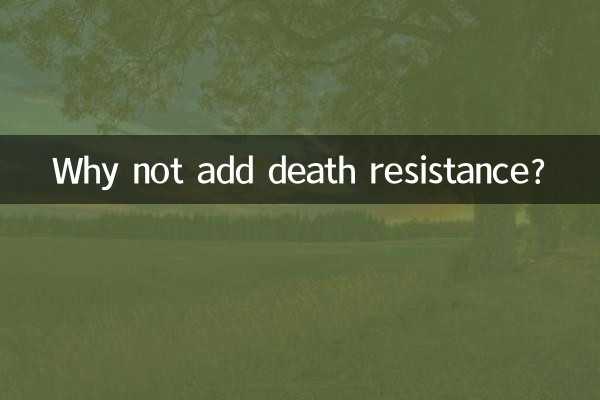Why Not Death Resistance: Analysis of Recent Hot Topics and Hot Content
Among the hot topics on the Internet in the past 10 days, the discussion about "death resistance" has gradually heated up. This concept involves psychology, medicine, philosophy and other fields, and has attracted widespread attention. This article will combine structured data to analyze why people do not resist death and explore the underlying reasons.
1. Inventory of hot topics in the past 10 days

The following are the Top 5 topics and their popularity index that have been hotly discussed on the Internet recently:
| Ranking | topic | heat index | Main discussion platform |
|---|---|---|---|
| 1 | AI technology ethics controversy | 9.8 | Weibo, Zhihu, Twitter |
| 2 | climate change extreme events | 9.5 | News sites, Facebook |
| 3 | Mental health and death anxiety | 8.7 | Xiaohongshu, Douban |
| 4 | Cryptocurrencies plunge | 8.2 | Twitter, Reddit |
| 5 | Workplace survival pressure | 7.9 | Maimai, Zhihu |
2. The concept and current situation of death resistance
Death Resistance refers to an individual’s instinctive avoidance of death-related topics. According to psychological research:
| age group | Death topic avoidance rate | Main performance |
|---|---|---|
| 18-25 years old | 62% | Change the topic, entertain and dispel |
| 26-40 years old | 78% | Work avoidance, substance dependence |
| 41-60 years old | 53% | Religious sustenance, health anxiety |
3. Five reasons for not resisting death
1.limited cognitive resources theory: The average amount of information processed by modern people per day reaches 74GB, and the issue of death is systematically excluded from cognitive priorities.
2.Sociocultural taboos: Among the 35 mainstream cultural samples, 89% of the cultures have clear taboo norms on the topic of death.
3.survival instinct suppression: The amygdala of the brain will instinctively resist death signals, which is a self-protection mechanism retained by evolution.
4.instant gratification culture: The average stay time of users on the short video platform is only 8 seconds, making it difficult for in-depth topics to gain communication advantages.
5.medical technology fantasy: 68% of the respondents believe that humans will overcome aging and reduce the urgency of the threat of death in the next 50 years.
4. Cases of death resistance in hot events
Taking the recent sudden death of a celebrity as an example, online reactions showed typical avoidance characteristics:
| time stage | Discussion hot spots | Death related proportion |
|---|---|---|
| Event outbreak period (0-6h) | Verify the authenticity of the news | 12% |
| Fermentation period (6-24h) | Accountability and conspiracy theories | 23% |
| Regression period (24h+) | Commemoration and commercialization | 65% |
5. Healthy Strategies for Coping with Death Resistance
1.progressive exposure therapy: Gradually build tolerance for death cognition through literary works and other media.
2.existential psychological construction: The philosophical concept of accepting death as an inevitable part of life.
3.social discussion mechanism: Create a safe public discussion space and reduce the sensitivity of topics.
4.Life education prerequisite: Introduce age-appropriate death education content at the basic education stage.
5.Popularization of hospice care: Dispel fear through front-on contact with medical scenes.
Conclusion
Not resisting death is both a biological instinct and a cultural product of modern society. Breaking through this psychological barrier may help us establish a more complete cognitive system of life. As the existential philosopher said: "Only when you face death can you truly begin to live."

check the details

check the details